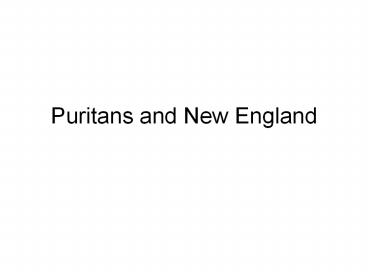Puritans and New England - PowerPoint PPT Presentation
1 / 24
Title: Puritans and New England
1
Puritans and New England
2
Objective 1
- Compare the development of the New England and
Chesapeake colonies as illustrated by the social,
political and economic institutions that shaped
them.
3
Objective 2
- Describe the Puritans and their beliefs and
explain why they left England for the New World.
4
Objective 3
- Explain how Massachusetts Bays conflict with
religious dissenters as well as economic
opportunities led to the expansion of New England.
5
Objective 4
- Describe the conflict between the colonists and
Indians in New England.
6
Puritans (Congregationalists)
- John Calvin
- Predestination
- Wanted to purify the Church of England of
Catholicism - Against separation of church and state
- Feared England becoming too secular
7
Puritan Ideas
- Protestant Work Ethic
- Convert the unbelieving
- Had special covenant with God
- Predestination
- Elect (Visible Saints)
- Visual conversion
- All people should be literate
8
Persecution of Puritans
- Puritans challenged King James I
- James responded by harassing them, closing
churches, etc. - Economic depression of late 16th century was
devastating
9
Separatists
- Predecessors to Puritans
- Wanted to separate, not purify the church
- Fled persecution in England
- 1608 Holland
- Feared Dutchification of children
- 1620 Plymouth
- Did not have charter
- William Bradford
- Mayflower Compact
10
Puritans Leave England
- 1630 obtained charter
- Massachusetts Bay Co.
- Intended to be religious colony
11
A City Upon a Hill
- Massachusetts Bay
- Stressed community over individual
- Protestant Work Ethic
- Strong discipline
- Transgressors severely punished
- Great Migration 70,000 Puritans came in 1630s
- Expanded into Connecticut and Rhode Island
12
Economics of Massachusetts Bay
- Agriculture, fishing, timber, furs
- Villages
- Close together
- Communal
- Small farms
- Singles could not live alone
- Stressed education
- Town meeting form of government
13
Education
- Harvard College (1636)
- First tax supported public schools (1642)
- First printing press in New World
14
The New England Primer (1683)
15
Government
- Free male church members could vote
- 40 of population had right to vote
- Everyone paid taxes
- Governor and his aides was elected annually
- Had almost unlimited powers
- John Winthrop was first governor
- Representative assembly also elected annually
16
New England Families
- Puritans migrated as families
- Stability
- Promoted growth
- Women had few rights
17
Agriculture
- Broad ownership of land
- Most farmers were 50 acres or less
- Needed to move westward
- No crop rotation
- Gap between rich and poor not large
- Owning land meant
- Economic power
- Political power
- Poor land quality meant more cities, centers of
trade
18
Pilgrims vs. Puritans
Few
Many
Early (1620)
Later (1629-30)
Poor class
Upper middle class
Uneducated
Educated
Separatists from state church
Loyal
Settled in Plymouth
Salem, Boston
Wm. Bradford, Wm. Brewster
John Endicott, Miles Standish, John Winthrop
19
Roger Williams
- Separatist
- Separation of church and state
- Puritans intruding on Indian land
- Fled in 1636 and obtained charter for Rhode
Island in 1644
20
Anne Hutchinson
- Antinomianism
- Faith alone necessary for salvation
- Goes against obeying law
- Goes against work being sign of being the Elect
- Kicked out of Massachusetts in 1638
21
Indian Relations
- Europeans brought disease
- Natives die and Puritans take land
- Showed God was on their side
- 1637 War with Pequots
22
King Philips War
- King Philip (Metacom) formed alliance of Indian
tribes - Coordinated attacks in New England
- 1676 52 towns attached
- King Philip captured ending war
23
New England Federation (1643)
- Four New England colonies unite to protect
themselves - Plymouth
- Massachusetts Bay
- Connecticut
- New Haven
- First attempt at colonial union
24
Changing Values
- As more people come to colonies
- More people pursue riches--move away from
Protestant Work Ethic - More diversity
- Puritans dispersed
- Half-way Covenant
- Dampened religious zeal
- Weakened Puritan hold on government

